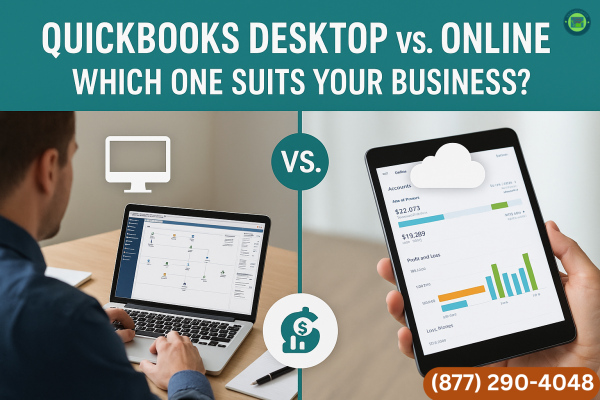One of the most dependable accounting software solutions for small and medium-sized businesses is QuickBooks, which Intuit created. Nevertheless, the decision between QuickBooks Desktop and QuickBooks Online can be difficult. Each version is equipped with distinctive capabilities that are especially designed to meet the requirements of various businesses. To assist you in making an informed decision, the following is a comprehensive comparison.
1. Accessibility and Deployment
Access your QuickBooks Online data on the go — all you need is an internet connection and any device. It is the perfect solution for business proprietors who are frequently on the move or manage remote teams.
In contrast, QuickBooks Desktop is deployed on a local computer or network. The device on which it is installed is the only device that has access to its potent features, unless you opt for additional hosting services.
QuickBooks Online emerged victorious in terms of accessibility.
2. Functionality and Features
QuickBooks Desktop boasts more robust inventory management capabilities, job costing, industry-specific reports, and bulk invoicing than the online version.
Although QuickBooks Online is in a state of perpetual evolution, it offers simpler features that are more appropriate for small businesses, startups, or freelancers with fundamental accounting requirements. Nevertheless, it provides real-time synchronization, automatic updates, and seamless integration with hundreds of applications.
QuickBooks Desktop is the preferred choice for advanced users, while QuickBooks Online is the preferred choice for those who prefer simplicity and convenience of use.

3. User Interface and Experience
QuickBooks Online includes a clean dashboard, effortless navigation, and automation tools such as automatic bank inputs and recurring invoices. Its interface is modern and user-friendly. It is intended for users with a limited background in accountancy.
QuickBooks Desktop has a more challenging learning curve, but it provides a greater depth of features and customization. It is more appropriate for finance professionals or accountants who require precise control over financial data.
QuickBooks Desktop is the preferred option for professionals, while QuickBooks Online is the preferred option for beginners.
4. Pricing Structure
QuickBooks Online operates on a monthly subscription basis, offering a variety of pricing tiers to facilitate the management of expenses for enterprises. Plans may be upgraded or downgraded as required.
QuickBooks Desktop necessitates either an annual subscription or a one-time purchase. Although it may appear to be cost-effective in the long term, enhancements and supplementary features (such as cloud access or payroll) incur additional expenses.
The flexibility of QuickBooks Online is the clear winner.
5. Multi-User Access and Collaboration
Additionally, it enables accountants to access the system directly without the need to transmit files.
However, QuickBooks Desktop necessitates additional licenses and configuration, rendering it less convenient for team-based work, despite its support for multi-user access.
Conclusion
The decision between QuickBooks Desktop and Online is contingent upon the scale of your business, industry, and accounting requirements. QuickBooks Desktop is an excellent option for those who prioritize robust capabilities and are amenable to being bound to a single system. However, QuickBooks Online is the superior option if you prioritize real-time collaboration, accessibility, and simplicity of use.
Assess your priorities, budget, and team structure to determine the version that is most compatible with your objectives.